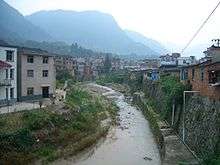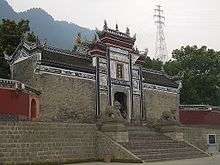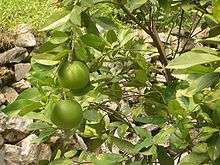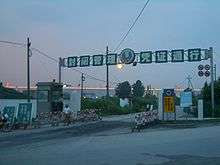Sandouping
| Sandouping 三斗坪镇 | |
|---|---|
| Town | |
|
On the Yangtze waterfront near Sandouping town center (Huanglingmiao Village), looking west toward Xiling Bridge and the Three Gorges Dam (not visible because of fog) | |
 Sandouping Location in Hubei | |
| Coordinates: 30°48′42″N 111°00′56″E / 30.81167°N 111.01556°ECoordinates: 30°48′42″N 111°00′56″E / 30.81167°N 111.01556°E | |
| Country | People's Republic of China |
| Province | Hubei |
| Prefecture-level city | Yichang |
| District | Yiling District |
| Area | |
| • Total | 178 km2 (69 sq mi) |
| Elevation(average) [1] | 480 m (1,570 ft) |
| Highest elevation | 1,197 m (3,927 ft) |
| Lowest elevation | 66 m (217 ft) |
| Population (ca. 2007)[2] | |
| • Total | 35,020 |
| • Density | 200/km2 (510/sq mi) |
| Time zone | China Standard (UTC+8) |
| Website | http://sdp.10.gov.cn/ |
| Sandouping | |||||||||
|
"Sandouping", as written in Chinese calligraphy | |||||||||
| Simplified Chinese | 三斗坪 | ||||||||
|---|---|---|---|---|---|---|---|---|---|
| Traditional Chinese | 三鬥坪 | ||||||||
| Postal | Santouping | ||||||||
| |||||||||
Sandouping (Chinese: 三斗坪; pinyin: Sāndòupíng) is a town in Yiling District of Yichang prefecture-level city in the Chinese province of Hubei. It is located on the right (southern) bank of the Yangtze River, next to Yiling District's border with Zigui County to the west. Sandouping is best known as the location of the Three Gorges Dam, which is the world's largest electricity-generating plant of any kind.[3][4]
Geography


The Town of Sandouping occupies 178 km2 on the right (southern) bank of the Yangtze River, opposite the town of Letianxi (乐天溪镇), to which it is connected by Xiling Bridge.[2][5] Sandouping is the only town in Yiling District that is located south of the river.[6]
Sandouping's western neighbor is the town of Maoping, the county seat of the nearby Zigui County. Although it is only a kilometer or two west of the dam (straight-line distance), it is actually several kilometers drive on Hubei Provincial Route 134, because of the terrain.[5]
Administratively, the Town of Sandouping is divided into 19 villages (村) and 1 neighborhood committee (居民委员会).[7][8] Sandouping's central urban area, where the town government and most services are located, is technically known as Yuanyi Village (园艺村). It is situated some 5 km east the of the southern end of the Three Gorges Dam. The neighborhood just to the east, known as Huanglingmiao Village (黄陵庙村), is named after Huangling Temple (黄陵庙) located there near the Yangtze River waterfront. It is being developed as a tourism area, centered around the riverboat dock.[5][7][8]
A secondary center of economic activity in the town is located in its western part, within walking distance from the service entrance to the Three Gorges Dam (Gaojiachong Village (高家冲) and Sandouping "neighhborhood committee").[7]
History

The predecessor of today's Sandouping, the village of Huangniupu (黄牛铺, "Yellow Cow Post Station") was established during the reign of the Hongzhi Emperor in 1496. Sandouping District was created in 1949 and transformed into Sandouping Town in 1984.[9]
Sandouping used to be a small fishing village until it was selected to be the site of the Three Gorges Dam. In 1999, at the peak of the construction, over 40,000 workers lived in Sandouping.[10] At the time, special permits were required to enter the town.[10]
Six out of nineteen Sandouping's villages are populated by families that have been resettled from the areas flooded by the waters of the Three Gorges Reservoir, or, earlier, the Gezhouba Reservoir.[7]
Economy

The town's economy is closely connected to the Yangtze River. Besides the Three Gorges Dam, major local enterprises include Hailun Shipyard (海轮造船厂) and Fazhong Vessel Servicing Company (发中船务有限公司).[2]
The three main agricultural products of Sandouping are citrus fruits (according to different governmental sources, 15,000 mu [ 1,000 hectares][2] or 10535 mu [702 ha][1] under cultivation, with an annual harvest of 14,000 metric tons [1]), silkworms (14400 mu/ 960 ha of mulberry pantations), and tea (3316 mu/ 221 ha).[2]
The town's authorities are working on expanding tourism in the area.[2][11]
References
| Wikimedia Commons has media related to Sandouping. |
- 1 2 3 三斗坪镇概况 Sandouping Town Overview, at the town government's site
- 1 2 3 4 5 6 三斗坪镇 (Sandouping Town), at the official site of Yiling District. (The article does not specify the year when the population was estimated; but other statistics, as well as population counts for other towns in the district, are dated 2007) (Chinese)
- ↑ "top-100-pt-4". Industcards.com. Retrieved 2009-08-01.
- ↑ "Three Gorges dam wall completed". BBC News. 20 May 2006. Retrieved September 26, 2009.
- 1 2 3 Road Atlas of Hubei (湖北省公路里程地图册; Hubei Sheng Gonglu Licheng Dituce), published by 中国地图出版社 SinoMaps Press, 2007, ISBN 978-7-5031-4380-9. Pages 26-27 (Yichang Prefecture-level City), or any other comparable atlas. Similar geographic info can be seen with Google Maps, at the coordinates in the infobox, or upon entering "Letianxi, Hubei. China" in the search box.
- ↑ Schematic map showing the division of Yiling District into counties at 夷陵概况 (Overview of Yiling District), compared to the county map in the provincial atlas
- 1 2 3 4 各村概况 (Summary of [Sandouping's] individual villages)
- 1 2 宜昌市夷陵区三斗坪行政区划图 Sandouping Town (Yiling District, Yichang City) area planning map] - detailed map of the town (the entire administrative area) at the town government's official site (Chinese)
- ↑ 三峡工程所在地三斗坪镇将建国际旅游明星镇 (Sandouping Town - home to the Three Gorges Project - will transform itself into an international tourist destination) (Chinese)
- 1 2 Kamran M. Nemati (November 1999). "Civil Engineering Delegation to the People's Republic of China". University of Washington. Retrieved September 26, 2009.
- ↑ 政协委员积极为三斗坪旅游名镇创建献计 (Sandouping's deputies [of Yiling District government] working vigorously on making Sandouping a tourist destination) (Chinese)

